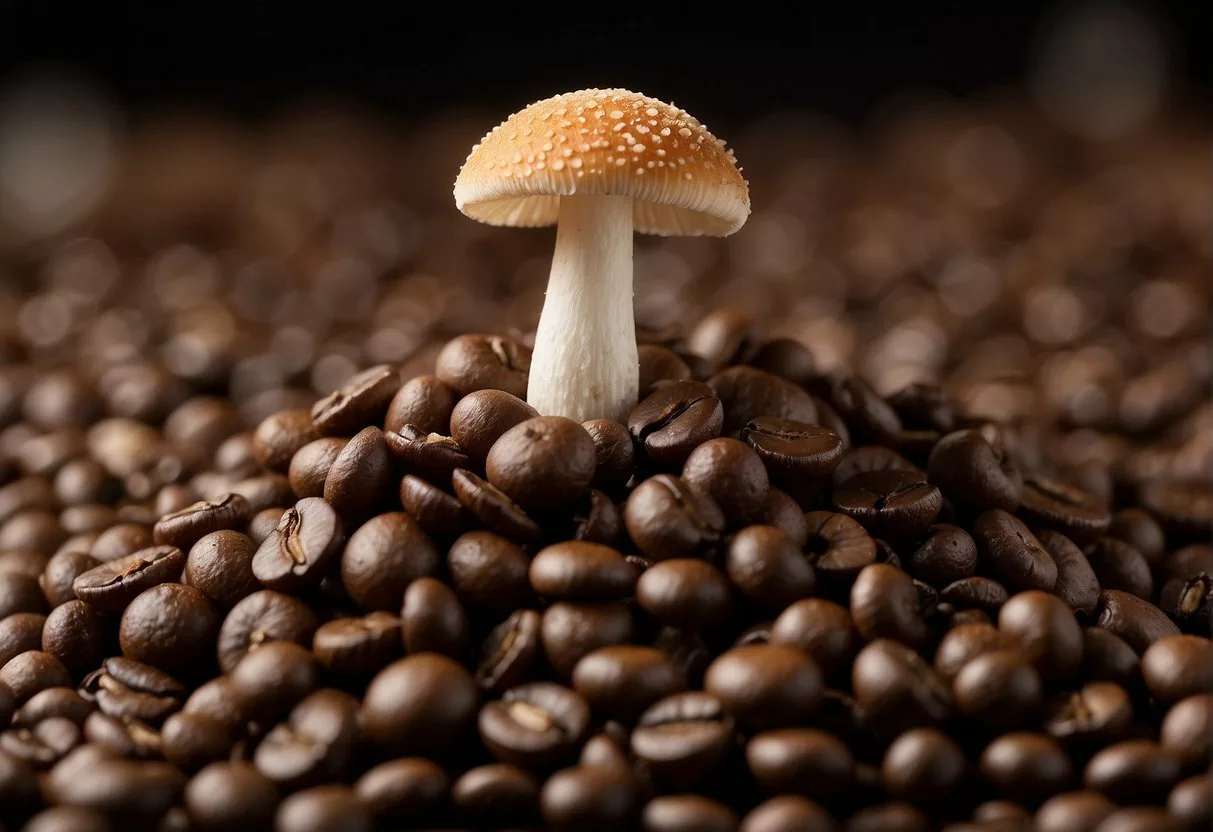Mushroom coffee has gained popularity for its potential health benefits and unique taste, paving the way for a new trend in the world of caffeine enthusiasts.
Derived from blending traditional coffee beans with medicinal mushroom extracts, this fusion beverage offers a range of health claims, from boosting the immune system to improving focus.
Yet, consumers may notice that mushroom coffee often comes with a heftier price tag than regular coffee.
The reasons for these higher costs are multifaceted, stemming from production complexities to market positioning.

The cultivation and processing of the medicinal mushrooms used in mushroom coffee, such as reishi, lion’s mane, and cordyceps, can contribute significantly to the cost.
These fungi require specific growing conditions. Their extraction processes are also more labor-intensive than conventional coffee bean harvesting.
Furthermore, the quality and source of the mushrooms, along with organic certifications, can drive up the price. This reflects the intricate balance between supply chain considerations and consumer demand.
Additionally, the novelty factor of mushroom coffee allows for premium pricing strategies.
As a relatively new entrant in the market, it benefits from the allure of wellness trends and the willingness of health-conscious consumers to invest in products that promise enhanced well-being.
As with many health-oriented products, the intersection of trendiness and the promise of health benefits enables brands to position mushroom coffee as a luxury item, further justifying its premium cost.
Exploring the World of Mushroom Coffee
Mushroom coffee is a unique blend that combines traditional coffee beans with the added benefits of medicinal mushrooms, bringing about a fusion that caters to wellness-minded individuals. Its price reflects a combination of special ingredients and health advantages.

The Unique Composition of Mushroom Coffee
Mushroom coffee integrates ground coffee beans with medicinal mushroom extracts, such as lion’s mane, chaga, reishi, turkey’s tail, cordyceps, and shiitake.
These mushrooms are renowned not just for their flavor, but for their beneficial compounds including polysaccharides, beta-glucans, and antioxidants.
High-quality mushroom extracts are carefully produced to retain their bioactive compounds. These compounds then infuse the brew with their characteristic immune-boosting properties.
Health Benefits of Mushroom Infused Brews
Often heralded for their health benefits, mushroom-infused brews combine the comfort of coffee with the reputed medicinal properties of fungi.
The concoction is believed to offer anti-inflammatory and antioxidant support to the immune system.
Adaptogenic mushrooms like reishi and cordyceps are added to assist the body’s response to stress and fatigue.
The presence of organic ingredients and complex plant compounds in mushroom powder makes it a sought-after alternative in the supplement market.
Mushroom Coffee in Modern Wellness Trends
Embracing the overlap of traditional medicine and modern wellness trends, mushroom coffee has found its niche.
The medicinal mushroom extracts are valued for their adaptogenic qualities within modern wellness trends.
Incorporating mushrooms into daily coffee rituals merges ancestral knowledge with contemporary lifestyle choices.
Consumers are drawn to the promise of a coffee that not only stimulates but also reinforces their health, justifying its higher price tag when compared to regular coffee.
Understanding the Cost Factors
Exploring the cost factors of mushroom coffee reveals the complexities behind its pricing. From production to consumer perception, several aspects contribute to the potentially higher expense.
From Ingredients to Cup: The Production Process
The production process of mushroom coffee plays a significant role in determining its cost.
Unlike traditional coffee beans, the fungi used in mushroom coffee often require meticulous cultivation conditions and additional ingredients.
The use of medicinally valued mushrooms, such as Reishi or Chaga, adds to the nutrition and perceived wellness benefits.
These mushrooms then undergo a detailed extraction process to combine with coffee beans, occasionally with added creamer for taste enhancement.
Furthermore, the integration of certifications, such as organic or fair trade, into the product can multiply the cost due to rigorous standards and practices that need to be upheld.
Market Dynamics and Mushroom Coffee Pricing
The unique market dynamics of mushroom coffee influence its pricing.
It caters to a niche set of consumers who value its purported health properties and thus are willing to pay a premium.
Factors such as research and development to ensure quality, the marketing and branding efforts to differentiate from standard coffee, and the relative scarcity compared to coffee beans contribute to a higher selling price.
Companies, like Ryze mushroom coffee[1], invest in telling their story and highlighting the value of mushroom coffee over traditional options, justifying their price point through transparency and consumer education.
Consumer Insights and Mushroom Coffee Value Perception
Consumers perceive the value of mushroom coffee through a lens that focuses on taste and wellness.
Although mushroom coffee is expensive compared to conventional coffee, purchasers often justify the expense by accounting for the health benefits and unique flavor profiles that mushroom coffee introduces.
The cost of mushroom coffee is thus aligned with the value perception, where the health and experiential upgrades it proposes lead to a willingness to consume the product despite the higher price tag.
Companies that transparently communicate these benefits, and adhere to high-quality standards and ethical practices, bolster consumer trust and loyalty.
References
- Page Not Found. https://amzn.to/3QQDppU Accessed November 7, 2025
